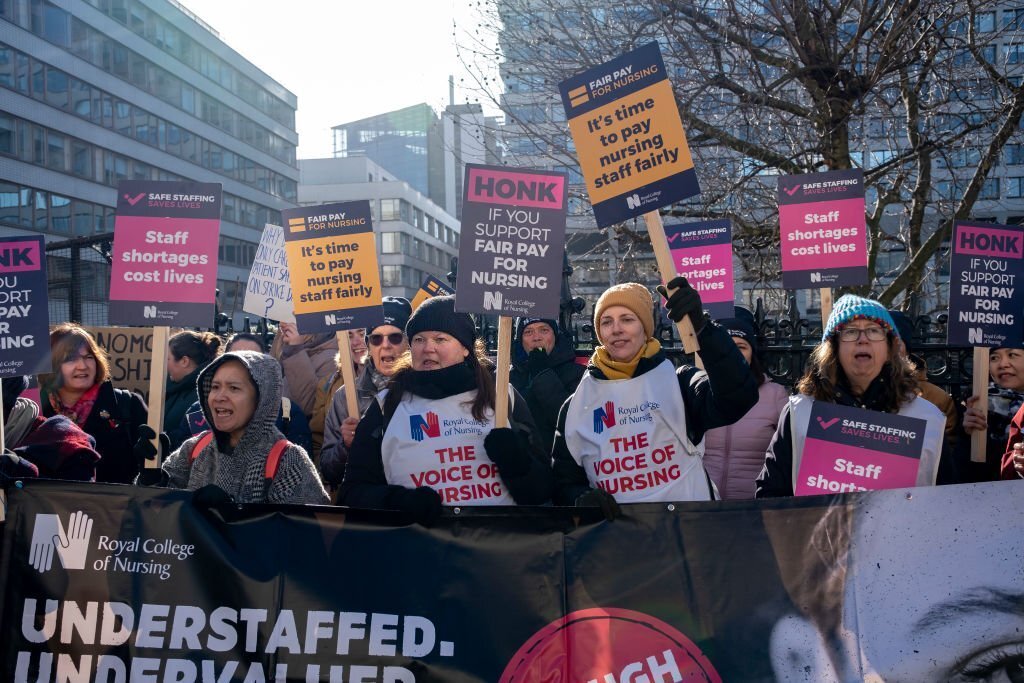In the UK, many employees, including British medical staff, teachers, doctors, lecturers, civil servants, and railway workers, embarked on a strike due to disagreements regarding salary increments and working conditions. Over 400,000 professionals from varying industries participated in a large-scale protest, citing a decline in their salaries over the years due to the surging cost of living and inflation. This mass demonstration coincided with the day of the government’s budget announcement.
Fair and reasonable increase in salary and benefits
Following the recent strikes, the date for the tube strike in 2023 remains uncertain. During the protests, banners were displayed by demonstrators with slogans such as “Teachers Deserve Better Pay,” “We Worked Too Hard, We’re Underpaid and Exhausted,” and “Enough is Enough.” The protesters marched from Hyde Park in London to the renowned Trafalgar Square, calling for a fair and reasonable wage increase and benefits. This massive strike was attended by several hundred thousand workers across the country and stood as one of the largest demonstrations since the beginning of last year’s strike wave.
The general strike of British medical staff
Recently, London saw thousands of individuals come together to march in support of the general strike organized by British medical staff. The protesters demanded a modest salary increase for health workers who have been striking due to their low wages. The “SOS NHS” group, a coalition of campaign groups and trade unions from the health sector in the UK, organized the march under stringent security measures.
The themes of protest placards of businesses
The protesters carried signs with slogans such as “Stop the healthcare system crisis” and “Fair wages for healthcare workers”, citing the rising cost of living in the UK as they demanded higher salaries for healthcare professionals. The demonstration drew support from a diverse group, including doctors, nurses, and other medical staff from the UK, as well as representatives from various unions and labour organizations.
Warning about the consequences of widespread strikes
Politicians are anxiously trying to determine the date of the upcoming 2023 tube strike, while the medical centre and hospital managers in Britain have issued a dire warning about the severe impact that a three-day strike by British medical staff would have on service levels and the worsening healthcare crisis. Despite recent strikes by British medical workers, the government has shown no willingness to address their working conditions or increase their wages, resulting in continued industrial action within the medical profession.
Politicians are urgently focused on pinpointing the date of the 2023 tube strike, as medical centre and hospital managers in Britain are sounding the alarm about the devastating consequences of the proposed three-day strike by medical staff on essential services and exacerbating the ongoing crisis. Despite recent strikes by British medical workers, the government has been hesitant to enhance their working conditions or raise their wages, prolonging the industrial action within the healthcare sector.
Heathrow Airport security guards strike.
The British trade union announced that more than a thousand security guards at London’s Heathrow Airport would go on strike. It is said that this strike is planned until the Easter holidays. “Threatening to ruin people’s hard-earned holidays with strike action will not improve the deal,” London’s Heathrow Airport trade union said in a statement.
Objections to the budget plan of the Ministry of Finance
As the British Ministry of Finance presented its budget plan to Parliament, thousands of UK citizens took to the streets for mass protests and strikes. Chancellor of the Exchequer, Jeremy Hunt, delivered the new budget proposal to Parliament in London amid widespread industrial action across the country. In light of the high cost of living and inflation rates exceeding ten per cent, Hunt has proposed an aid package for the people. “We will strive to resolve these disputes, but only through measures that do not exacerbate inflation,” Hunt stated in response to the ongoing strikes.
Details of the budget plan of the UK government
To relieve people, the British finance minister presented an aid package expected to amount to 94 billion pounds (about 107.7 billion euros) this year and next. In particular, electricity and gas bills will be subsidized for another three months, and government funding for child care will be increased. Hunt said: “High inflation is the root cause of the strikes we have seen in recent months.”
The UK government’s opposition to the continuation of strikes
UK has about 1.1 million job vacancies amid a post-Brexit migration of EU workers and a record number of people on long-term sick leave. UK’s Conservative government has signalled that it is ready to negotiate with unions over fair and reasonable pay rises only after the strikes. Looking ahead to one of the biggest days of protests in the UK in recent months, British Chancellor of the Exchequer Jeremy Hunt stressed that he would not give in to union demands.
Decrease in the per capita income of British households.
According to a study, despite a better economic outlook and year-over-year inflation not as high as first thought, Britons are facing the most significant drop in living standards since the 1950s. This results from the current estimate by the independent budget body Office for Budget Responsibility (OBR). On that basis, the UK could avoid recession, but disposable household income per head is likely to fall by 5.7% in the two years to the end of March 2024, the sharpest rate since 1957.
Deterioration of the economic situation with the continuation of strikes
The article answered the question of when is the tube strike 2023. The UK has witnessed several strikes by civil servants over the past months, and workers have expressed dissatisfaction with the country’s deteriorating economic situation caused by rising energy prices and rising inflation. During the past weeks, more than 500,000 healthcare sector employees, school teachers and university professors, drivers, employees of the railway sector, workers and many other sectors and industries started massive strikes.

